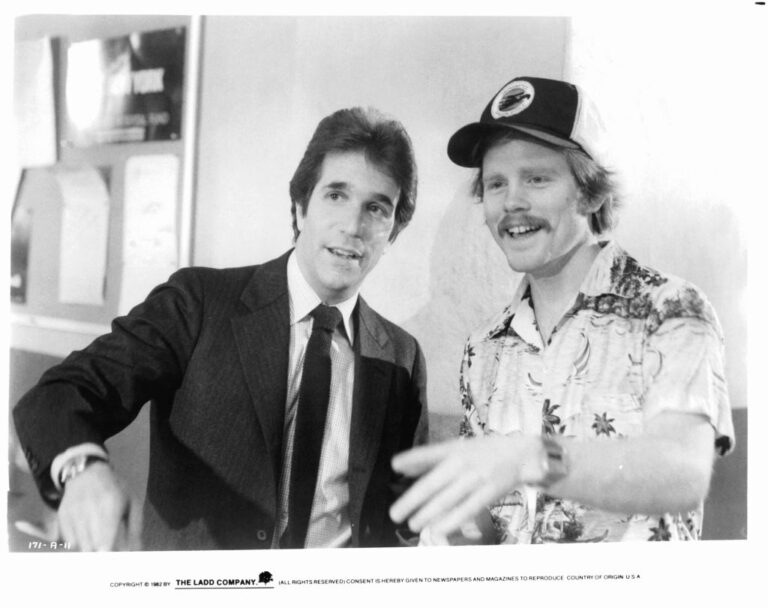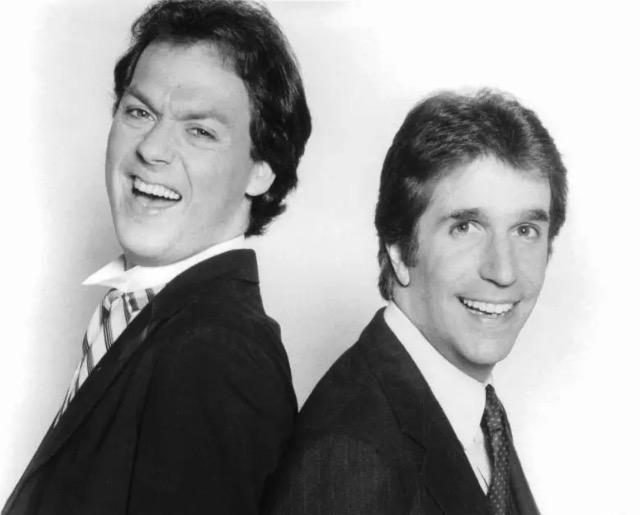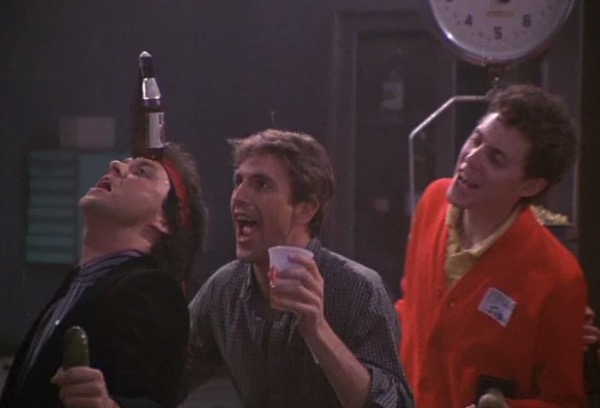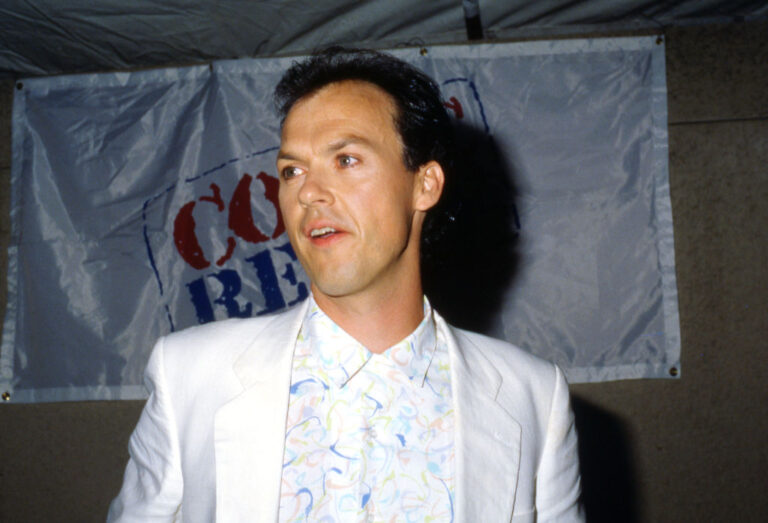The city never truly slept — it just held its breath after midnight.
Down in the underbelly of Manhattan, among the pale hum of fluorescent lights and the cold, metallic scent of disinfectant, Chuck Lumley clocked in for another quiet night shift at the city morgue.
He was used to silence. It was, in many ways, his only friend. A thin man in his mid-thirties with kind eyes and a nervous habit of checking the clock, Chuck lived by order and routine. Each night was the same: log the names, tag the bodies, make the reports, and listen to the hum of the cooling units until dawn.

He liked predictable. Predictable meant safe.
That ended the night Bill Blazejowski walked in.
Bill burst through the morgue door like he’d mistaken it for a nightclub. “Hey, Chuckie boy!” he boomed, dropping a duffel bag on the floor and grinning like he’d just invented oxygen. His jacket was two sizes too big, his tie looked stolen, and his energy filled every cubic inch of the sterile room.
Chuck sighed. “You’re… the new night attendant?”
Bill gave a mock salute. “The one and only. You can call me Billy Blaze — entrepreneur, dreamer, future legend.”

Chuck blinked. “I’ll call you Bill.”
Bill looked around, unimpressed. “Man, this place is dead.”
“That’s… the idea,” Chuck muttered.
At first, Chuck tried to ignore him. But Bill was impossible to ignore. He turned the morgue radio to full volume, told wild stories about failed inventions, and started pitching business ideas between autopsy reports. “You know, Chuck,” he said one night, leaning over a cold slab, “you got a good head for details. You and me — we could start something. Something big.”
Chuck adjusted his glasses. “I already have a job.”
Bill grinned. “Nah. You got a routine. That’s different.”
Chuck rolled his eyes — but a small part of him envied that manic spark.
Then came Belinda.
She entered like a sigh in the middle of chaos — tall, poised, with eyes that looked like they’d seen too much. Her job was temporary, she said — part-time cleaning staff to make ends meet. But something about the way she moved through the morgue felt… familiar. Too precise. Too aware.
Chuck noticed her immediately. So did Bill.
“Hey there, angel of the afterlife,” Bill said with a wink on her first night. “You, me, coffee after shift?”

She smiled faintly. “I don’t drink coffee.”
“Then tea! Or bourbon. I adapt!”
But her eyes lingered on Chuck instead — kind eyes, cautious hands. He made her laugh softly once, when he dropped a clipboard trying to look composed. For Chuck, that sound was enough to brighten an entire week.
Things began to change. The morgue felt less like a tomb and more like a secret refuge. Bill filled the place with half-broken radios and Chinese takeout boxes. Belinda brought jazz records and played them softly when no one was looking. Chuck even started staying after his shift ended — just to be near her.
Then, one Friday night, everything unraveled.
It started with a delivery.
Two men rolled in a sealed body bag. No name. No paperwork. Just a note stapled to the zipper:
DO NOT OPEN. TRANSFER AT 0600.
Bill whistled. “Creepy. Probably a mob thing.”
Chuck frowned. “We don’t take transfers without ID.”
Belinda, standing behind them, went pale. “Don’t touch it.”
Chuck turned. “What?”
She looked terrified — not nervous, but truly frightened. “You need to leave it alone, Chuck.”
Bill chuckled. “You know what’s in there, don’t you?”
She said nothing.
An hour passed. The hum of the lights felt heavier than usual. Bill paced, muttering theories — drugs, weapons, even a corrupt politician. Chuck tried to focus on paperwork, but his curiosity gnawed at him.
At 3:14 a.m., the lights flickered.
Then the power died.
The backup generator sputtered once and went silent.
They were plunged into darkness.
“Bill?” Chuck whispered.
A flashlight clicked on. Bill’s grin flashed in the beam. “Adventure time.”
Before Chuck could stop him, Bill yanked the zipper.
The stench hit them like a wall. But worse was what lay inside.
A man’s face — frozen in terror — with a small tattoo behind his ear: an hourglass.
Belinda gasped. “Oh God… it’s him.”
The sound of boots echoed in the hallway above.
“Who’s him?” Chuck demanded.
Belinda’s voice trembled. “You need to hide. Both of you.”
The footsteps were coming closer. Heavy. Purposeful.
Bill crouched beside the body. “You know this guy.”
“He was part of something I ran from,” she said. “They’re coming for the package. For me.”
Bill’s grin vanished. “What kind of package?”
“The kind you don’t survive delivering twice.”
The door upstairs slammed open. Shadows crossed the stairwell.
Chuck grabbed her arm. “There’s a cold storage unit in the back.”
They sprinted down the corridor, slipping past rows of covered bodies. The air was freezing. They ducked into the storage unit and locked it from the inside. The hum of footsteps passed outside — slow, deliberate, searching.
Then — silence.
Chuck’s breath came out in mist. He turned to her. “What’s going on?”
Belinda looked at him, tears glinting in the dim light. “That man in the bag… he was part of a syndicate. We ran smuggling operations through hospital shipments. I got out years ago. But they don’t let people go.”
Bill whistled softly. “You always know how to pick workplaces, Chuck.”
Suddenly, metal groaned — the morgue door being pried open.
Bill’s eyes darted. “They’re gonna find us.”
Chuck thought fast. “The freezers. If we lower the temp—”
“We’ll freeze,” Bill said.
“Not if we’re lucky.”
They climbed inside the nearest compartment, pulling the door halfway shut.
The room outside erupted — shouting, smashing, gunfire.
Belinda pressed a hand over her mouth, trembling.
Through the crack, Chuck saw shadows — men searching, overturning tables.
Then, a deafening crash. The emergency generator roared back to life.
The lights flickered once more… revealing something the intruders hadn’t expected.
The body bag was empty.
Later, police sirens wailed outside. The intruders were gone. Vanished into the night.
But so was Belinda.
They found only a small, bloodstained note taped to the morgue door:
“Don’t look for me. The hourglass runs both ways.”
Weeks passed. The city forgot. The morgue returned to silence.
Except one night, as Chuck finished his report, a faint hum echoed from the storage room — low, steady, familiar.
Bill frowned. “You hear that?”
Chuck did. He followed the sound to the last freezer.
Inside lay a sealed envelope addressed to him.
A photo. Belinda, alive. Smiling.
And behind her — a wall filled with hourglass tattoos.
